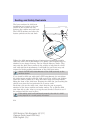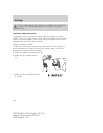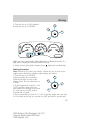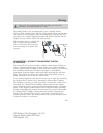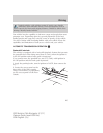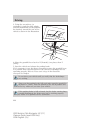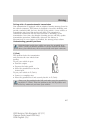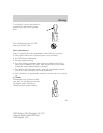
A limited AdvanceTrac function using only engine power reduction will
still help control the wheels from over-spinning. When the brakes have
cooled down, the system will again function normally. Anti-lock braking is
not affected by this condition and will function normally during the
cool-down period.
AdvanceTrac enhances your vehicle’s stability during maneuvers that
require all available tire traction, like in wet/snowy/icy road conditions
and/or when performing emergency maneuvers. In an emergency
lane-change, the driver will experience better overall vehicle traction,
and have better control of the vehicle.
The AdvanceTrac system helps the driver maintain steering control if
the vehicle begins to slide excessively left or right or spin out.
AdvanceTrac will attempt to correct the sliding motion by applying
brake force at individual tires and, if necessary, by reducing engine
power.
Driving conditions which may activate AdvanceTrac include:
• Taking a turn too fast
• Maneuvering quickly to avoid an accident, pedestrian or obstacle
• Hitting a patch of ice
• Changing lanes on a snow-rutted road
• Entering a snow-free road from a snow-covered side street, or vice
versa
• Entering a paved road from a gravel road, or vice versa
• Hitting a curb while turning
• Driving on slick surfaces
• Cornering while towing a heavily loaded trailer (refer to Trailer
Towing in this chapter)
The AdvanceTrac system automatically turns on when the engine is
started. However, the system does not function when the vehicle is
traveling in R (Reverse). In R (Reverse), ABS and the traction
enhancement feature will continue to function.
The AdvanceTrac button allows
the driver to control the availability
of the AdvanceTrac system.
AdvanceTrac system status is
indicated by a warning indicator
light with a “sliding car” icon in the instrument cluster that will flash
2003 Aviator f/k/a Navigator LS (231)
Owners Guide (post-2002-fmt)
USA English (fus)
Driving
222



